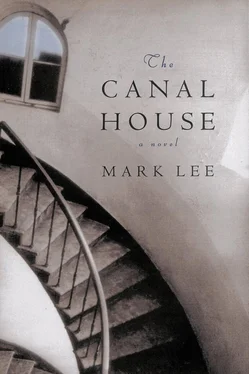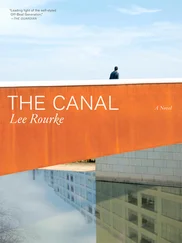Some Indonesian soldiers lounged on the back of a cargo truck and watched while a group of Australian army rangers crowded around a passenger van with an Oxfam emblem. The vanished aid workers had taken their keys back to Darwin and the Australians were trying to hotwire the vehicle. Daniel strolled over to the men and smiled like we were all traveling to the same vacation resort.
“Can I help you steal this?” he asked.
A red-haired corporal grinned. “Sure thing, mate. We found the ignition wires, but the steering wheel is still locked up.”
Daniel borrowed a commando knife, pried off the plastic covering around the steering column, and began splicing wires together. In a few minutes he’d started the engine. The corporal slapped him on the back. “All right, everybody! Get a rat up yah! We’re goin’ to war!”
Elbowing each other like a rugby team, we squeezed into the van. The corporal drove around the parking lot. “Where’s the bloody map?” he asked. It turned out that someone named Sergeant Malloy had the maps and he was on another plane. Daniel reached into his equipment bag and pulled out a map of Dili photocopied from a tourist guidebook. “Right,” he said. “Turn right.” And we were on our way.
A quarter mile from the airport, we came to a roundabout with an empty concrete fountain at the center. Five tiered baskets were set inside the fountain and a dozen white angels sat around the rim, all of them kneeling on one knee while they blew trumpets at the sky. Someone had chopped off the angel heads and there were bullet marks on their wings. I grabbed the digital camera and tried to get to my knees, but the bus was crowded with soldiers and a muscular ranger carrying a machine gun was sitting in front of the sliding door.
“No room, mate. Sorry.”
“Can we stop?” I asked. “Stop for a second—”
“Not now!” the corporal shouted. “Gotta keep moving!”
We continued past the fountain and turned onto the main road. It was dry season on the island. The palm trees were still green, but the surrounding undergrowth was dead and brittle. In the distance, the ocean shimmered with a bright turquoise color. South of the road a brown ridge rose abruptly to mountains covered with brush and trees. The burning smell got stronger as we approached the city. We crossed a concrete bridge that went over an empty river, then reached a side road that led toward the sea.
“Here?” the corporal asked. “Do I turn here?”
“Keep going,” Daniel said. “Stay on the main road.”
The muscular soldier let me drink from his water bottle. “I sure hope those militia bastards shoot at us,” he said.
“And why is that?”
“If they shoot at us, then we can shoot ’em back. If they don’t shoot, then it gets into rules.”
A row of concrete houses had been looted and torched by the anti-independence militias. Some of the buildings were still on fire, the smoke rising from charred roof beams and blackened sheets of roofing. The corporal slowed down and everyone was silent. We passed an abandoned school, the Australian consulate, and a small military airport still held by the Indonesian army. The streets were empty and the arson became more systematic: entire blocks of buildings had been torched, leaving a few concrete pillars and piles of blackened rubble. The few buildings that survived looked temporary and fragile.
All the East Timorese men and any women young enough to be raped had fled into the hills. Only the old women and a few children remained. They stood in the street or picked through the rubble. When our van rolled down the street, they stared at us as if we were ghosts that would vanish at any moment. A few Indonesian soldiers wearing oversized tan uniforms were searching for something to steal. They glared at the Australians but kept their M16 rifles pointed down.
“They’re not militia?” asked the muscular soldier.
“No. They’re regular army. All of them are going home in a couple of days.”
“Bet we can’t shoot them either. More rules.” The soldier spat out the window.
We reached the harbor area and Daniel told the corporal to stop the van. The Australians were supposed meet another squad of rangers up at the soccer stadium, but Daniel wanted to stay near the beach.
“No worries,” the corporal said. “Take care of yourself and don’t get shot. The whole country ain’t worth it.”
The rangers turned toward the mountains and the blue van disappeared up the street. Daniel and I walked east past the harbor area. Two inter-island ferryboats were tied to the main wharf and Indonesian soldiers were loading them up with army trucks and all the property from the destroyed houses. I could hear cocks crowing in bamboo cages and singsong pop music from a portable radio. The street in front of us was littered with old mattresses, broken furniture, and the shells of burned automobiles. Pieces of singed paper were everywhere and they drifted across the street like wayward leaves. I took out my digital camera and took a few quick shots, but the smoke and the hazy sky made it seem as if someone had pasted a dirty strip of cellophane on the lens.
I was sweating from the heat and my mouth was dry. There was no real authority in Dili, no clear lines that divided a safe area from the dangerous zone. Daniel was very alert and he walked slowly. Near the Governor’s Office, he stopped and looked out at the harbor. The UN fleet was anchored about a mile out and the Seria was in the middle of the convoy.
“You think Julia’s out on deck?” Daniel asked. “Maybe she has some binoculars and she’s watching us right now.”
“I hope she doesn’t see us. I’m not looking my best today.”
As I switched to a wide-angle lens, a convoy of six vehicles came toward us. The transport truck leading the group had an Indonesian flag draped over the hood and militiamen with red-and-white headbands were squeezed into the truck cab. One of the men had an M16 rifle, which he pointed out the window. I stood there, expecting him to fire, but the convoy kept moving. The first two trucks were stacked with stolen property: television sets, refrigerators, a large blue couch. They were followed by three Land Rovers with UN insignia and then an open cattle truck crammed with women and children. They were being kidnapped, taken down the road to West Timor, and when they saw us they raised their hands and screamed for help. A young militiaman with a bamboo stick was standing on the back and he began beating the people next to him. The convoy kept moving, but I was able to get one quick photograph. I was still holding my camera, getting ready for another shot, when two more militiamen drove up behind us on motorcycles.
They were young Timorese men with beards and long hair. One man carried an M16 and the other a shotgun, the weapons dangling from shoulder straps. When they reached Daniel and me, they circled around us with the bikes, revving their engines and screaming in Tetum. The third time around, the man with the shotgun pulled a machete out of his belt. He was trying to cut the strap on my camera bag, but he missed and the tip of the knife scratched across my shoulder blade. I felt a stinging sensation and then they turned back onto the road and raced after the convoy.
Daniel stepped behind me. “Damn, he cut you. You’re bleeding.”
“How bad is it?”
“I don’t know. Let’s get out of the sun.”
We cut across a patch of dead grass to the Governor’s Office. Standing beneath the white colonnade, I removed my shirt and Daniel used it to wipe off the blood.
“It’s a three-inch cut,” he said. “Let’s hope it doesn’t get infected.” He smeared antibiotic ointment on the wound, then applied some gauze and a bandage. I pulled on my spare shirt. “Does it hurt, Nicky?”
Читать дальше












